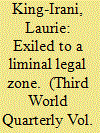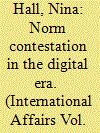|
|
|
Sort Order |
|
|
|
Items / Page
|
|
|
|
|
|
|
| Srl | Item |
| 1 |
ID:
074646


|
|
|
|
|
| Publication |
2006.
|
| Summary/Abstract |
For the past 60 years Palestinians have been positioned in a liminal political zone in a global system of nation-states. Although the Palestinian refugee crisis is the oldest and largest in the world, Palestinians are also relegated to a liminal legal zone in that the UN-established institutions such as the unrwa to deal with the Palestinians' needs and demands through exceptional channels outside the jurisdiction of the UN's human rights regime. As a consequence, Palestinians' rights are always open to question and frequently violated, whether they are living under occupation, as second class citizens in Israel, or as refugees in surrounding Arab countries. Although the Palestinian diaspora is situated in a variety of countries, legally the Palestinians are nowhere. This article examines the liminal legal zone to which Palestinians have been exiled, particularly in regard to refugee rights, but also in the context of international humanitarian law and international prosecution of war crimes committed against Palestinians. In examining this liminal legal zone, the article also notes that in the age of the global 'war on terror', we are all at risk of becoming Palestinians as legal guidelines and guarantees are eroded.
|
|
|
|
|
|
|
|
|
|
|
|
|
|
|
|
| 2 |
ID:
124580


|
|
|
|
|
| Publication |
2013.
|
| Summary/Abstract |
Purpose-This article explores human rights and refugee status of the North Korean diaspora, with particular focus on the social construction of refugee rights.
Design/methodology/approach-The study analyzes the realities of the unstable status of the North Korean refugees in Asian and Western countries by focusing on the discrepancy between refugee rights and refugee status. Legal, political, diplomatic, and social issues around North Korean refugee status are examined by conducting an examination of the related countries' political discourses and actual policies.
Findings-North Korean escapees in Northeast and Southeast Asia have lived in hiding from forced repatriations by the PRC and neighboring countries, vulnerable to human rights violations. While North Koreans in South Korea have been granted legal citizenship, many North Korean asylum seekers staying in other countries have not been under legal or humanitarian protection. Although the concerned states are under pressure from the international community advocating universal human rights of North Koreans, they enforce refugee policies pursuing their own political and economic interests. Thus, the status of North Koreans is unstable and threatened when refugee rights are politically constructed by the concerned states' political and economic interests as well as by international relations.
|
|
|
|
|
|
|
|
|
|
|
|
|
|
|
|
| 3 |
ID:
167111


|
|
|
|
|
| Summary/Abstract |
Activists in the internet era are taking action through online petitions, twitter storms and by forming new digital advocacy organizations such as Campact, 38 Degrees and GetUp!. However, no International Relations (IR) scholarship has systematically examined the role of digital advocacy organizations in norm contestation. Digital advocacy organizations warrant study given their international reach, their large memberships, their longevity, their frequent campaigning activity and their claimed impact. This article focuses on the responses of three digital advocacy organizations in Australia, the UK and Ireland to the same external crisis: an increasing number of refugees worldwide. It asks: when and why did these organizations engage in behavioural norm contestation during the refugee crisis? Their use of behavioural contestation is a puzzle, given that digital advocacy organizations have low implementation power. The article draws on interviews with activists and experts, and finds that advocacy groups firstly use discursive contestation (debating the meaning and importance of norms), and then may engage in behavioural contestation (influencing the implementation of norms). Discursive contestation is less costly, and perceived to be less effective, than behavioural contestation. The article suggests that digital advocacy organizations can mobilize people online and offline, and IR scholars should examine this important source of power. This article forms part of the special section of the May 2019 issue of International Affairs on ‘The dynamics of dissent’, guest-edited by Anette Stimmer and Lea Wisken.
|
|
|
|
|
|
|
|
|
|
|
|
|
|
|
|
|
|
|
|
|